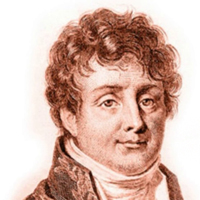Joseph Fourier
Jean-Baptiste Joseph Fourier was a French mathematician and physicist born in Auxerre and best known for initiating the investigation of Fourier series, which eventually developed into Fourier analysis and harmonic analysis, and their applications to problems of heat transfer and vibrations.
Through his The Analytical Theory of Heat, he introduced an infinite mathematical series to aid in solving conduction equations. This analysis technique allows the function of any variable to be expanded into a series of sines of multiples of the variable, which is now known as the Fourier series
Fourier, the son of a tailor, first attended the local military school, showed such proficiency in mathematics in his early years that he later became a teacher in mathematics at the same school. The ideals of the French Revolution. After the École Polytechnique was opened at the same school, he joined its faculty.
In 1798, Fourier accompanied Napoleon on his expedition to Egypt for three years, he was engaged in extensive research on Egyptian antiquities, gave advice on engineering and diplomatic undertakings. After his return to France, he was appointed prefect from 1802 to 1814. Following Napoleon’s fall from power in 1815, Fourier was appointed director of the Statistical Bureau of the Seine, allowing him a period of quiet academic life in Paris. His name is one of the 72 names inscribed on the Eiffel Tower.

Joseph Fourier
Date of Birth: 21 Mar 1768
Birth Place: Auxerre, France
Proffession: French mathematician
Nationality: French
Death: 16 May 1830, Paris, France


